Protecting Delicate Optical Equipment from Radiation

 High-energy radiation is not just a danger to human beings and other living things. While the effects of radiation on people and other creatures can be deadly and gruesome, energy transmitted in this form can be destructive in other ways, too. Radiation can be thought of as a particularly intense way of transmitting energy through space, and that means that anything that might be susceptible to damage can potentially be affected. A delicate piece of lab equipment or a sensitive computer station, for example, can just as well suffer damage from radiation as could a person, a plant, or an animal.
High-energy radiation is not just a danger to human beings and other living things. While the effects of radiation on people and other creatures can be deadly and gruesome, energy transmitted in this form can be destructive in other ways, too. Radiation can be thought of as a particularly intense way of transmitting energy through space, and that means that anything that might be susceptible to damage can potentially be affected. A delicate piece of lab equipment or a sensitive computer station, for example, can just as well suffer damage from radiation as could a person, a plant, or an animal.
Where intense radiation is likely to be found, efforts to mitigate against its potentially harmful effects therefore do not end with the protection of humans and other living things. Many times, nearly as much effort will be expended trying to keep expensive, important equipment and other assets from being damaged. There are a variety of basic approaches to this, many of them analogous to the measures most commonly used to protect people.

Most common of all is the use of lead or another very dense metal to provide shielding. While radiation of especially high energy will often penetrate most materials with ease, metals like lead are relatively impervious. Even a half-inch thick layer of lead can vastly reduce the amount of radiation that will make it to the other side, making this kind of shielding a good option where it is practical.
In reality, employing lead or a similar kind of shielding is not always possible, though. Some of the pieces of equipment that are most susceptible to radiation-inflicted damage, for example, are those that incorporate optical sensors that measure the quality or intensity of light. While a piece of lead placed in front of such a sensor would block all of the radiation that might otherwise damage the sensor, it will also prevent the sensor from functioning.
Because of this, special Radiation Glasses often prove to be valuable in these settings. Typically treated with exotic materials like cerium, the Best Radiation Glasses will block most transmission while still allowing light to pass through.
Those who Buy Radiation Glasses from companies like Kemper Medical to fit equipment with must still often account for shifting effects like an increase in yellow-wavelength visual light relative to others, but the advantages typically greatly outweigh these relatively minor and tractable downsides. Making good use of such options can keep even the most delicate of optical equipment protected from what would otherwise be damaging radiation.